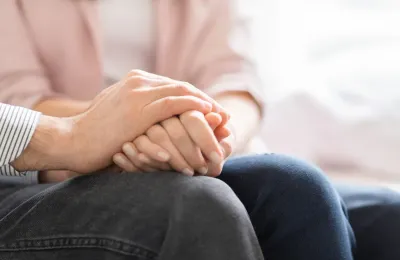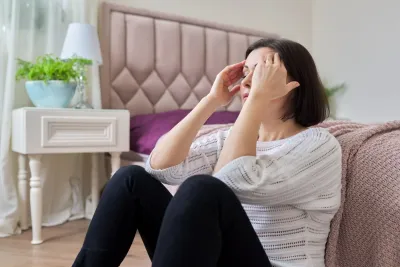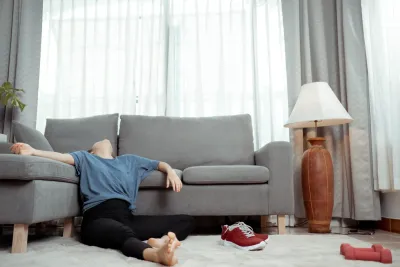
Key Takeaways
Menopause affects sleep, emotions, and relationships, and supportive partners can make a meaningful difference.
- Menopause is more than hot flashes—it can disrupt sleep, mood, energy, and daily life for years.
- Hormonal changes affect the body’s temperature control, making night sweats and heat sensitivity common and real.
- Learning the basics of menopause helps partners respond with empathy instead of frustration.
- Listening, validating feelings, and asking what she needs is often more helpful than trying to fix the problem.
- Small changes, especially improving the sleep environment, can reduce stress and support both partners.
Watching someone you love struggle with menopause can feel frustrating and confusing. One night she is throwing the covers off, the next she is exhausted, irritable, or emotional in ways that feel unfamiliar.
You want to help, but you are not always sure how or what to say.
This guide is for partners who want to show up better. Not perfectly. Just better. With empathy, practical steps, and a clearer understanding of what is actually happening
Introduction to Menopause
Menopause is a universal milestone in women’s health, affecting every woman at some point in her life.
According to the North American Menopause Society, menopause symptoms can begin during perimenopause, often starting in a woman’s thirties or early forties, and may last for years.
The menopause transition brings a wide range of symptoms—physical, emotional, and cognitive—that can impact daily life, work, and relationships.
Understanding what happens during menopause and how it affects the body is the first step in managing menopause symptoms and improving quality of life.
By learning about the menopause society’s recommendations and available support, women and their partners can navigate this transition with greater confidence and care.
Menopause Statistic: In a study, 74% of women surveyed reported that menopause had a negative effect on their relationships with their partners, with the 67% of respondents claiming it caused arguments and fights.
First Things First: This Is Not Just About Hot Flashes
Menopause affects sleep, mood, energy, confidence, and relationships. When nights are disrupted, days get harder. When days are harder, communication can break down.
The best thing you can do is learn the why behind the what.
Menopause Vocabulary Every Partner Should Know
Menopause terms get thrown around, but most partners never get a clean explanation. Here is a quick cheat sheet.
- Perimenopause: The transition phase leading up to menopause. Hormones fluctuate heavily here and symptoms often feel unpredictable.
- Perimenopausal: Refers to the stage when a woman is experiencing the transition to menopause, often marked by symptoms such as irritability, joint pain, menstrual irregularities, hot flashes, and sleep disturbances.
- Menopause: Officially defined as twelve months without a menstrual cycle. Symptoms can continue well beyond this point.
- VMS Vasomotor Symptoms: The medical term for hot flashes and night sweats. These are neurological responses, not surface-level heat issues.
- Night Sweats: Intense episodes of overheating during sleep that can soak sheets and cause repeated awakenings.
- Hot Flashes: Sudden waves of intense heat, often starting in the chest or face, that can cause sweating, flushing, and discomfort. These can happen during the day or at night and are one of the most common menopause symptoms.
Knowing these terms helps you follow conversations, research solutions, and most importantly, avoid minimizing what she is feeling.

How to Support Your Partner During Menopause
Since menopause can impact emotions, routines, and connection, the following steps highlight simple ways to show up for your partner when it matters most.
Did You Know: More than 25% of partners admitted knowing little or nothing about menopause. Understanding the physical symptoms, can greatly enhance both the partner's quality of life and the relationship.
1. Learn the Basics: Why Menopause Is a Big Deal
Learning about menopause is not a one and done task. It takes time to understand the physical and emotional changes involved, and that growing context helps you show up with more patience and less frustration.
- Hormones are shifting: This isn’t just “getting older”—her body is going through real, physical changes.
- Symptoms are real: Hot flashes, night sweats, mood swings, and sleep problems aren’t in her head.
- It’s unpredictable: Symptoms can come and go, and every woman’s experience is different.
When you understand what is happening, you are more patient, less likely to take things personally, and better equipped to offer real menopause support.
Common Menopause Symptoms
- Hot flashes and night sweats: Affect up to three out of four women and are driven by changes in how the brain regulates body temperature.
- Trouble sleeping or frequent wake ups: Around 40 to 60% of menopausal women report sleep problems. Including difficulty falling asleep, waking multiple times a night, or waking too early.
- Mood swings or increased irritability: Hormonal shifts can impact brain chemistry, making mood swings and emotional sensitivity more common.
- Brain fog or difficulty concentrating: Many women experience short term memory lapses, slower recall, or trouble focusing during the transition.
- Fatigue during the day: Ongoing sleep disruption combined with hormonal changes leads to persistent daytime tiredness. Fatigue is one of the most commonly reported quality of life complaints during menopause. )
- Changes in body temperature sensitivity: Menopause narrows the body’s comfort range, so small temperature changes can feel extreme.
2. Support Through Listening, Not Solutions
Lead with listening. When your pertner is dealing with menopause, being heard often matters more than being fixed.
- Ask, don’t assume: “How are you feeling today?” or “Is there anything I can do right now?” It shows you are paying attention without jumping to conclusions.
- Validate her experience: “That sounds tough. I’m here for you.” Phrases like these help her feel seen. You do not need to fully understand it to acknowledge it.
- Avoid minimizing: Don’t say “It’s not that bad” or “You’ll get over it.” These comments can unintentionally shut the conversation down, even if they are meant to reassure.
- If you’re unsure: “I want to help, but I’m not sure how. What do you need from me?” This opens the door to clearer communication and collaborative problem-solving.
- Feeling heard lowers stress, builds trust, and reduces emotional distance. In many cases, that support is more helpful than any quick solution.
Menopause Statistics: Only 20% of women seek help discussing their problems in menopause.

3. Better Sleep Starts With Support
Sleep often takes the biggest hit during menopause. Helping create a cooler, more comfortable bedroom is one of the best ways you can support her. It can actually benefit both of you.
- Keep the bedroom cool: Set the thermostat to 60–67°F (15–19°C).
- Upgrade bedding: Use lightweight, moisture-wicking sheets and blankets. Helps reduces sweat buildup.
- Try a cooling mattress pad: Products like Chilipad allow her to control her side of the bed, so she can stay comfortable without freezing you out.
- Have water and a fan nearby: A glass of water and a fan within reach can make nighttime wake ups less disruptive.
Better sleep supports mood, patience, focus, and daytime energy. When sleep improves, many other menopause symptoms feel easier to manage, too.
4. Support Her Through Mood Swings
Mood changes during menopause can come on fast and feel intense, and it is easy for partners to take them personally. In most cases, they are driven by hormonal shifts, stress, and fatigue, not by how she feels about you.
- Stay calm: If she’s irritable, remember it’s often hormone-driven.
- Give her space if needed: Sometimes the best support is a little distance. Let the emotions settle.
- Offer comfort: A hug, a cup of tea, or just sitting together can help.
Consistent, steady support builds emotional safety. Knowing she is supported, even on hard days, helps strengthen trust and connection over time.
Help Support Your Partner With Better Sleep
Discover the power of reducing the symptoms of menopause with our Chilipad cooling mattress topper. Experience a significant decrease in hot flashes and night sweats, naturally enhancing sleep comfort.
5. Audit Your Sleep Environment
Just a few small changes can make the bedroom cozier and help both of you get better sleep without the usual nighttime hassles.
- Is the room cool and dark?
- Are the sheets and blankets breathable?
- Is there a fan or air purifier for circulation?
- Is there enough personal space for both of you?
A comfortable bedroom helps both of you sleep better and reduces stress.
6. Support Healthy Eating
Help her make food choices that can ease menopause symptoms by following a menopause-friendly diet.
- Encourage balanced meals: Focus on plenty of fruits, vegetables, whole grains, and lean proteins.
- Calcium and vitamin D: These are important for bone health. Suggest foods like yogurt, leafy greens, and fortified plant milks.
- Limit triggers: Spicy foods, caffeine, and alcohol can make hot flashes and night sweats worse for some women. Be open to adjusting meal plans or snacks together.
- Stay hydrated: Keep water handy, especially at night.
- Cook together: Try new recipes that are both nutritious and enjoyable. Making meals together can be a fun way to connect.
A healthy diet can help manage weight, support mood, and reduce the severity of some menopause symptoms. Plus, eating well is good for both of you!
7. Bridge the Relationship Gap
Menopause can create emotional distance if it goes unspoken. Staying connected means checking in before misunderstandings have a chance to grow.
- Check in regularly: “How are we doing?” or “Is there anything we should talk about?”
- Learn together: Read about menopause or attend doctor’s appointments as a team.
- Prioritize connection: Even small gestures—like a note or a favorite snack—show you care.
When you approach menopause as a team, understanding grows and your relationship stays strong through the changes.
8. Know When to Get Help
When symptoms start to feel overwhelming or unmanageable, outside support can be an important next step. Encourage her to talk to a doctor if symptoms are severe.
- If sleep, mood, or hot flashes are overwhelming, professional help can make a big difference.
- Offer to go with her to appointments or help research options.
The right medical support can reduce symptoms, ease daily stress, and help both of you feel more stable and supported. It's completely okay to ask for help along the way.
9. Remember It’s About Teamwork
You do not need to have all the answers. Being present, paying attention, and showing willingness to adapt matter far more than doing everything perfectly.
- Show up, ask questions, and be willing to adapt.
- Celebrate small wins together.
- Remind her (and yourself): You’re in this together.
Approaching menopause as a shared experience builds trust, resilience, and connection for both of you.
The Bottom Line
Menopause is not something to fix, it is something to face together. Showing up with patience, empathy, and a willingness to adapt makes a real difference.
When you treat menopause as a shared experience, support feels stronger and your relationship stays connected.
FAQs About Helping Your Wife During Menopause
How can I support my wife during menopause?
Start by listening and learning. Menopause affects sleep, mood, and daily comfort, so empathy, patience, and small supportive actions often matter more than quick solutions.
Is it normal for menopause to affect our relationship?
Yes. Sleep disruption, fatigue, and emotional changes can strain communication. Regular check-ins and treating menopause as a shared challenge help keep relationships strong.
How long do menopause symptoms last?
Symptoms vary widely. Some women experience them for a few years, while others may notice changes for longer. There is no single timeline.









